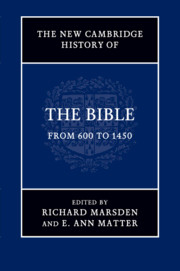Book contents
- Frontmatter
- Contents
- Figures
- Contributors
- Preface
- Abbreviations
- Abbreviations of books of the Bible
- Table of Psalm numbering
- Introduction
- Part I Texts and Versions
- Part II Format and Transmission
- Part III The Bible Interpreted
- 26 Byzantine Orthodox exegesis
- 27 The patristic legacy to c. 1000
- 28 The early schools, c. 900–1100
- 29 The Bible in medieval universities
- 30 Scripture and reform
- 31 Jewish biblical exegesis from its beginnings to the twelfth century
- 32 The Bible in Jewish–Christian dialogue
- 33 The Bible in Muslim–Christian encounters
- Part IV The Bible in Use
- Part V The Bible Transformed
- Bibliography
- Index of biblical manuscripts
- Index of scriptural sources
- General index
- References
33 - The Bible in Muslim–Christian encounters
from Part III - The Bible Interpreted
Published online by Cambridge University Press: 28 May 2012
- Frontmatter
- Contents
- Figures
- Contributors
- Preface
- Abbreviations
- Abbreviations of books of the Bible
- Table of Psalm numbering
- Introduction
- Part I Texts and Versions
- Part II Format and Transmission
- Part III The Bible Interpreted
- 26 Byzantine Orthodox exegesis
- 27 The patristic legacy to c. 1000
- 28 The early schools, c. 900–1100
- 29 The Bible in medieval universities
- 30 Scripture and reform
- 31 Jewish biblical exegesis from its beginnings to the twelfth century
- 32 The Bible in Jewish–Christian dialogue
- 33 The Bible in Muslim–Christian encounters
- Part IV The Bible in Use
- Part V The Bible Transformed
- Bibliography
- Index of biblical manuscripts
- Index of scriptural sources
- General index
- References
Summary
Islamic origins and early awareness of Christianity
In the original version of the Cambridge History of the Bible, C. F. Evans described the uniqueness of Christianity among world religions as like its being born with a Bible in its cradle. Extending the metaphor, Islam's own singular feature was to be born into the family of Abraham, the youngest of three siblings. The fact is celebrated in the Qurʾān: ‘We sent Jesus, son of Mary, in their footsteps, to confirm the Torah that had been sent before him: We gave him the Gospel with guidance, light and confirmation of the Torah already revealed – a guide and lesson for those who take heed of God’ (5: 46). In another passage (9:111), the Qurʾān, the Gospel and the Torah are mentioned together, each said to bear and fulfil the true promise of the almighty. These verses depict a historical sequence of sacred texts revealed or inspired by the one, unique, divine source. Notwithstanding the supposed unity of the grand monotheistic tradition, it is hardly surprising that family differences would break out between (and even among) descendants of the primordial three. The present chapter explores the more prominent controversies between the two younger members of the family, Christianity and Islam.
Scholarly debates over recent years concerning the origins of Islam require first a brief outline of some of the issues raised as they affect (or do not affect) the initial stage of controversies between Christians and Muslims. Two broad strands of thought are usually identified, the traditionalist and the revisionist. Because the debates arise over scholars’ different evaluations of the earliest Arabic historical sources that purport to record the origins of Islam, the two sides have also been designated ‘sanguine’ and ‘sceptical’ respectively.
- Type
- Chapter
- Information
- The New Cambridge History of the Bible , pp. 638 - 656Publisher: Cambridge University PressPrint publication year: 2012



